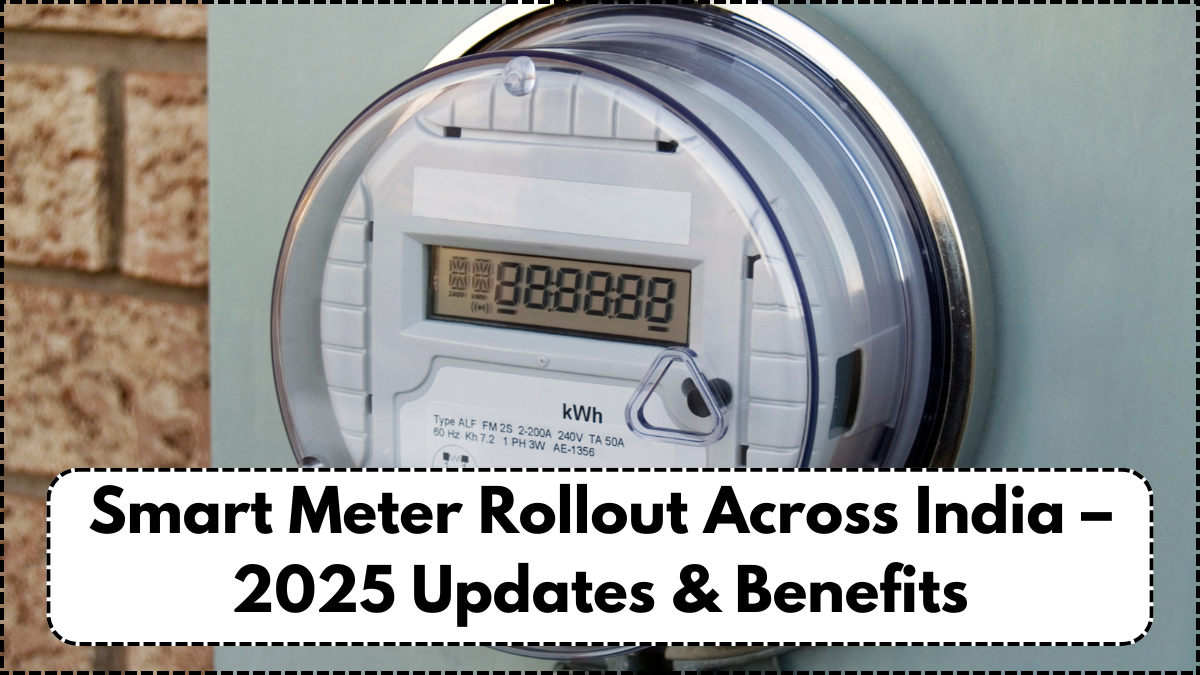The energy sector in India is rapidly evolving, and Smart Meters 2025 India rollout is at the forefront of this transformation. As power companies push for smarter and more efficient electricity management, the installation of smart meters is becoming widespread across the country. These devices enable accurate energy monitoring, better billing transparency, and efficient grid management. This article explores the latest developments in the smart meter installation program, highlighting how they benefit consumers and utility providers alike.

What Are Smart Meters and Why Are They Important in 2025?
Smart meters are digital devices that record electricity consumption in real-time and communicate this data to power utilities. Unlike traditional meters, they provide detailed insights into energy use, allowing for:
-
Precise billing based on actual consumption
-
Faster detection of outages or faults
-
Remote monitoring and control by power companies
-
Encouragement of energy conservation through consumer awareness
-
Support for dynamic pricing and demand response programs
In 2025, energy monitoring through smart meters is becoming crucial for India’s push towards a more efficient and sustainable power grid.
Current Status of Smart Meter Installation in India
The government and state electricity boards have accelerated the smart meter rollout across urban and rural areas. Here’s an overview of the current installation progress:
| Region | Estimated Smart Meters Installed | Target for 2025 | Major Benefits |
|---|---|---|---|
| Northern India | 5 million | 10 million | Reduced theft, accurate billing |
| Southern India | 4.5 million | 9 million | Real-time outage detection |
| Western India | 3.8 million | 8 million | Enhanced grid stability |
| Eastern India | 2.5 million | 6 million | Improved energy efficiency |
| Central India | 2 million | 5 million | Consumer awareness programs |
The numbers reflect a strong commitment to digitizing energy infrastructure and improving service quality.
Benefits of Smart Meter Installation for Consumers and Utilities
The widespread deployment of smart meters in 2025 offers several advantages:
-
Accurate billing: Eliminates estimated bills and billing disputes by recording actual energy use
-
Energy monitoring: Consumers can track their consumption patterns and manage usage better
-
Reduced power theft: Utilities can detect illegal connections and tampering faster
-
Efficient grid management: Enables load balancing and reduces technical losses
-
Convenience: Remote meter reading removes the need for manual visits, speeding up billing cycles
These benefits contribute to a more transparent and responsive electricity supply system.
Challenges in Smart Meter Implementation
While the benefits are significant, challenges remain in the smart meter rollout:
-
High upfront costs for meter procurement and installation
-
Resistance from consumers unfamiliar with digital technology
-
Data privacy and cybersecurity concerns related to energy usage data
-
Infrastructure gaps in remote or underdeveloped areas
-
Training needs for utility staff to manage and maintain smart meters
Ongoing government support and consumer education are critical to overcoming these hurdles.
Future Outlook for Smart Meters in India
Looking ahead, smart meters will play an integral role in India’s energy transition. Advancements in IoT, AI, and data analytics will enhance energy monitoring capabilities, enabling more dynamic pricing, integration of renewable energy sources, and smarter consumption habits. The 2025 rollout is just the beginning of a digital energy revolution that promises efficiency, transparency, and sustainability for all stakeholders.
Conclusion
The Smart Meters 2025 India initiative marks a significant step towards modernizing the electricity sector. With improved energy monitoring, accurate billing, and better grid management, smart meters are transforming how power is consumed and managed across the country. As installation efforts continue, consumers and utilities alike will reap the benefits of smarter, cleaner, and more efficient energy use.
Frequently Asked Questions
What is the main purpose of smart meters in India?
Smart meters provide real-time electricity consumption data to enable accurate billing and better energy management.
How do smart meters help in energy monitoring?
They record detailed consumption patterns, allowing consumers and utilities to track and optimize energy usage.
Are smart meters installed in rural areas as well?
Yes, the rollout includes both urban and rural regions to improve electricity access and management nationwide.
What challenges are faced in smart meter installations?
Challenges include cost, consumer resistance, data security, and infrastructure limitations.
How can consumers benefit from smart meters?
Consumers get precise bills, can monitor their energy use, and contribute to reducing wastage and theft.
Click here to know more